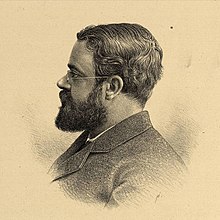|
Alfredo Chavero
Alfredo Chavero (1841–1906) was a Mexican archaeologist, politician, poet, and dramatist. According to Howard F. Cline, "Chavero's most enduring claim to remembrance rests...on [his] completion and extension of Ramírez's plans to republish major native histories and his editorship of pictorial documents."[1] ResearchChavero conducted numerous investigations on Mexican antiquities. He published Historia Antigua de Mexico, as well as several works on Aztec archaeology, especially on ancient monuments. While excavating the pyramids of Cholula, he discovered some idols that are now in the National Museum of Mexico. His books are often referred to because of his research on Father Sahagún and to the Sun Stone. . Political careerChavero became a member of the Mexican Congress in 1869. He supported the Mexican presidents Benito Juárez, Sebastián Lerdo de Tejada, Manuel González, and Porfirio Díaz in succession, notwithstanding their different policies. On 25 June 1879, the government of Diaz ordered the execution of nine citizens of Veracruz who were suspected of conspiracy. This act was severely criticised. This resulted in great public indignation against Mier y Terán, who had executed the order, and Diaz. Chavero was at the time grand master of a masonic lodge and expelled Mier y Terán from the brotherhood. Cavero also suspended Diaz from his masonic rights. These actions garnered great popularity Chavero. In the Mexican Congress, Chavero held a roaring speech against Mier y Terán and Diaz. Afterwards Chavero reconciled with Diaz. Chavero was elected senator in 1886, and was professor for mining, teaching also at law schools of Mexico. Chavero was elected a member of the American Antiquarian Society in 1881.[2] When the Mexican government proposed the Law of Monuments (1897), which passed overwhelmingly in the Mexican Congress, Chavero opposed the provision banned the export of Mexican artifacts, which in his view "hindered the flow of artifacts to museums abroad and thus obstructed the cause of science."[3] At the 1902 International Congress of Americanists in New York, Chavero gave some credit to the French project headed by Joseph Florimond Loubat for major discoveries at Monte Albán. This public declaration before the International Congress of Americanists, including those by Eduard Seler and Franz Boas, were interrupted by Leopoldo Batres, inspector national monuments and Chavero's rival. Batres had excavated at Monte Albán and strenuously objected to Chavero's assertions, since the work was paid for by the Mexican government.[4] Chavero donated the Chavero Codex of Huexotzingo to the National Museum of Mexico in 1906.[5] PoetryChavero is the author of the dramas “La Reina Xochitl” and “La tempestad de un beso,” “Quetzalcoatl,” “Los amores de Alarcón,” “La hermana de los Ávilas,” “El mundo de ahora,” and more. WorksA selected list of Chavero's writings of ethnohistorical interest is published in the Handbook of Middle American Indians.[6]
References
|
||||||||||||||||||||||||||||||||
